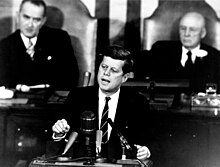" We choose to go to the Moon"
KENNEDY SPOKE ON SEPTEMBER 12,1962
AT RICE UNIVERSITY
The "Address at Rice University on the Nation's Space Effort", or better known simply as the "We choose to go to the moon" speech, was delivered by U.S. President John F. Kennedy in front of a large crowd gathered at Rice Stadium in Houston, Texas on September 12, 1962. It was one of Kennedy's earlier speeches meant to persuade the American people to support the national effort to land a man on the Moon and return him safely to the Earth.

"somewhat less than we pay for cigarettes and cigars",
equating to 40 cents per week "for every man, woman
and child in the United States", saying that the
"high national priority" of the Moon program will require
this to rise to more than 50 cents a week.[4]
The speech[edit]

John F. Kennedy speaks at Rice University
| |
| Duration | 18 minutes |
|---|---|
| Date | September 12, 1962 |
| Venue | Rice Stadium |
| Location | Rice University, Houston, Texas |
| Theme | The US Space effort |
See also Works related to We choose to go to the Moon at Wikisource
JFK explained the cost of the entire space budget to be "somewhat less than we pay for cigarettes and cigars", equating to 40 cents per week "for every man, woman and child in the United States", saying that the "high national priority" of the Moon program will require this to rise to more than 50 cents a week.[4]
On September 12, 1962, President Kennedy delivered his speech before a crowd of 35,000 people in the Rice football stadium. The most memorable and quoted portion of the speech comes in the middle:

to put a man on the Moon before a joint session
of Congress, May 25, 1961
We set sail on this new sea because there is new knowledge to be gained, and new rights to be won, and they must be won and used for the progress of all people. For space science, like nuclear science and all technology, has no conscience of its own. Whether it will become a force for good or ill depends on man, and only if the United States occupies a position of pre-eminence can we help decide whether this new ocean will be a sea of peace or a new terrifying theater of war.
I do not say that we should or will go unprotected against the hostile misuse of space any more than we go unprotected against the hostile use of land or sea, but I do say that space can be explored and mastered without feeding the fires of war, without repeating the mistakes that man has made in extending his writ around this globe of ours.
There is no strife, no prejudice, no national conflict in outer space as yet. Its hazards are hostile to us all. Its conquest deserves the best of all mankind, and its opportunity for peaceful cooperation may never come again. But why, some say, the Moon? Why choose this as our goal? And they may well ask, why climb the highest mountain? Why, 35 years ago, fly the Atlantic? Why does Rice play Texas?[5]
We choose to go to the Moon! ...[6] We choose to go to the Moon in this decade and do the other things,[7] not because they are easy, but because they are hard;
because that goal will serve to organize and measure the best of our energies and skills, because that challenge is one that
we are willing to accept, one we are unwilling to postpone, and one we intend to win ...[8]








No comments:
Post a Comment